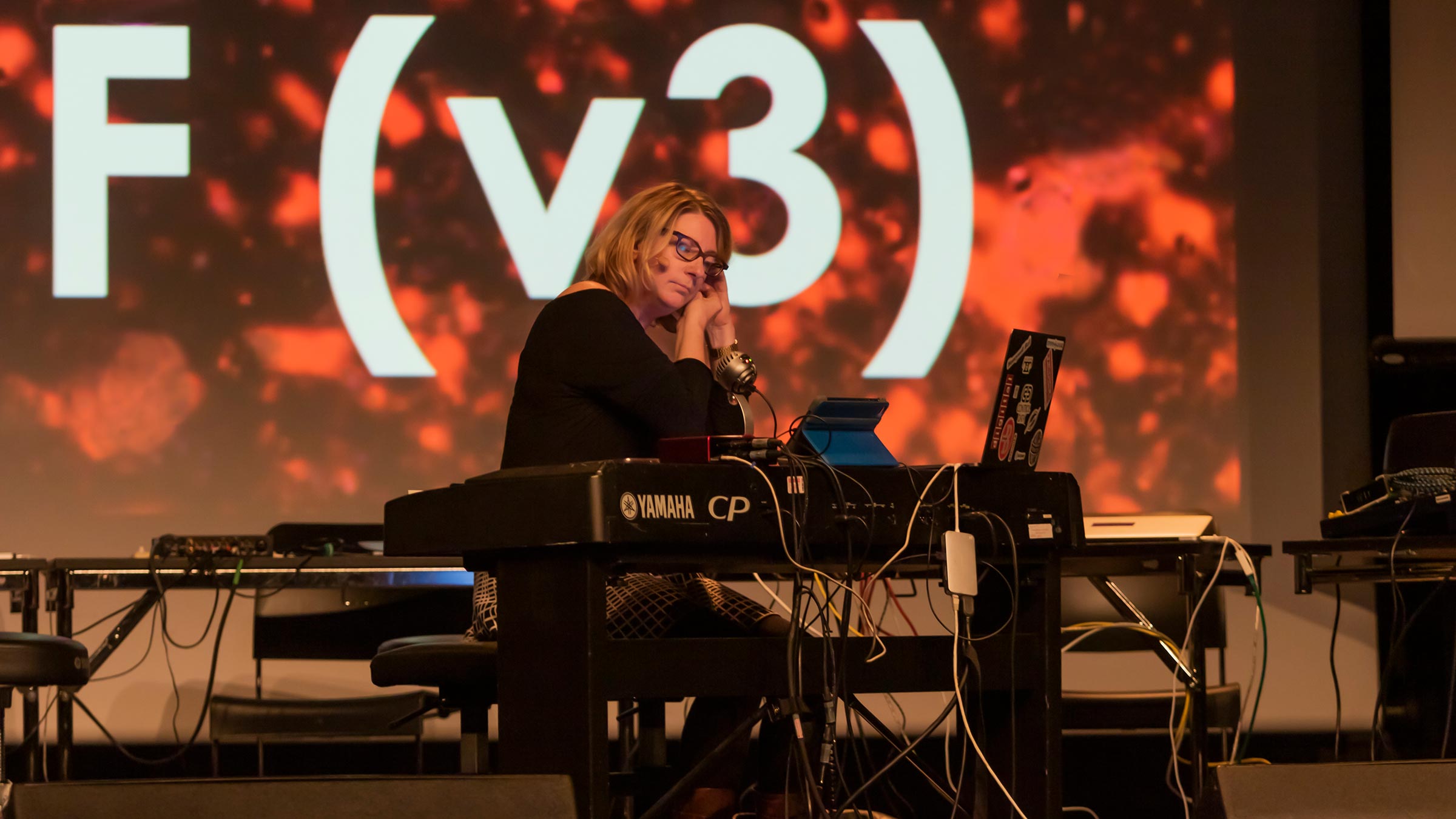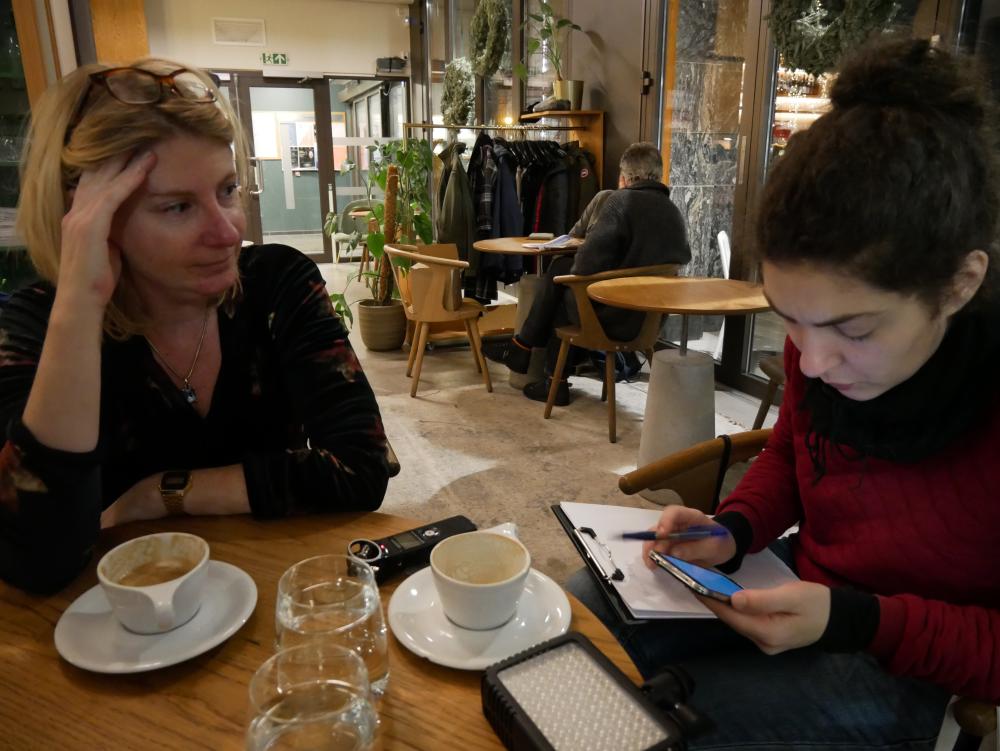An Interview with Rebekah Wilson
What is your background?
I’m trained as a composer on orchestral and electro-acoustic composition. And I taught myself to program computers and did a lot of network programming. When I started working at STEIM in Amsterdam as an artistic co-director then I got really into real-time electronic music performance. That would change my life going from writing compositions to working in real-time with other musicians. I’m also a business owner and co-founder of Source Elements and we make software for real-time recording over the internet for studios like Disney and Warner Brothers, and orchestras that use it to do recording when they can’t be in the same place with the artists. I also do research on how we can music together over the internet in real time, which I’ll talk about tomorrow.

What motivated you to teach yourself programming?
Ah, it is really simple. I was in the studio in the mid-1990s using a software and we all had only one computer, there was no computer at home so you had to go to the studio to use it. I realised that we are all using the same software and when we have a concert we all sound kind of the same because we are using the same tools. I realised, if I want to sound like myself I have to learn to write my own software. That was all.
What are your experiences being a woman in music technology?
Probably the same as every other woman, that it is not many of us. When we get to hang out with each other it is really nice to talk about that. But also to have a sense of what is needed to bring other people of diverse backgrounds into the field, we are a minority and we know that there are other minorities.
Sometimes things are arbitrary in surface, the problem is that you get in a position that you feel like you’re a token invitation as a women. Or you’re in a group of men and they start realising, “oh no, there is a woman around,” and they change how they react. These can be real social problems, but on the functional/technical side there is no issue at all. There really hasn’t been or it has been a long time since I felt that any man, and they were usually very old men, who had an issue with a woman being around technology.
But when you’re sitting around a table and you’re talking about technology, people don’t really care where you come from as long as you’re interested and engaged in the topic as they are interested and engaged in. If I had to go to a conference or go to a visit meeting with men, starting to talk about technology makes me forget that there is a gender imbalance there. But I think about it a lot, no grand solutions yet, it is just a time and a perseverance problem. I don’t think about it as a women’s problem rather as a diversity problem.

Did you have a role model or mentor?
I have an amazing mentor, who has been really instrumental to me to help guide my own learning and development. Her name is Caroline Nevejan and she is the Chief Science Officer of Amsterdam. When I met her she was doing her PhD as a sociologist, and I learned a lot about what it means how we perform together when we are not in the same room. A lot of my research has been based on hers insights. I’m really interested in theory and I bring it into my own work, use the ideas for my research.
Also how you develop the technology?
Definitively, I’m working more and more to use theory to develop the technology. I will talk about that tomorrow, I think this is something that we have to be doing.
Can you give one example?
Sure, for example I write software that helps with speaking when we’re communicating remotely. When we’re talking to each other there are certain kinds of behaviours that we have. For example we’re sitting here, we see each other, you’re nodding, I can see you’re paying attention. But suddenly you’re on the internet, I can’t see you but I can hear you and I don’t know if you’re paying attention or not [holding hands in front of her face to hide], but you’re giving me a verbal [hmm] feedback. Research on these behaviours is a really useful knowledge. From a technology perspective it helps me to know how people can feel more connected.
Would you like to introduce more your research project related to that?
I have a keynote tomorrow ‘Becoming latency native’! Let’s say right now there is latency between us. But when I think to speak about this latency, by the time it gets out of my mouth, there is latency, to get it across the air, until it hits your ears and to get to your brain and then for you to cognitively understand what I’m saying - all this is latency. But our brains have evolved to think there is no latency. We don’t think to ourselves like “oh there is a delay between what I say and what you hear.” But if I go over there and I yell to you, it takes a bit longer, suddenly the communication is a little bit difficult. You have to wait up. Or when you have a long distance call and you have to wait, all of this is interfering our naturally taught behaviour.
We can actually learn over time to this feeling of latency over the internet, to become native. I have a 5 year old god-daughter and she is on the internet all the time, she is talking to other people, I don’t know that she knows that there is any latency because to her it is since she is born. She is latency native to a certain latency more than we are and I’m really interested in thinking about what happens when we start living on the moon, where there is a two and a half second return latency, or on Mars, which it’s between three and 20 minutes. There is an elliptical orbit on planets and then sometimes we have radio silence in between, how are we going to communicate? How are we going to be together as humans? This is not something that science fiction talks about. You never have a TV show in like “Hello, ground control? …..[ waits a few seconds ]…. Oh hi, how are you?” They never do that. We have to think about this.
What advice would you give women who are interested in pursuing a career in music technology related fields?
Find a school with professors that you really like, that person could be anywhere, it could be next door or across the world. That is all I can say. I found some people who inspired me to explore. The first time I saw a real-time performance I fell in love with was Kaffe Matthews. She was the first one I saw and thought, “I want to do that!,” I was lucky to get a time with her and asked what she was doing. This is why STEIM was so amazing, you got at the dinner table with these people that you wanted to work with, wanted to learn from. Seek out the people who’re doing the work you admire, because then you’ll be engaged. And hopefully that are the kind of people that would share how they work with you. Make stuff, lots of stuff. Throw it away maybe if you don’t like it, but just make it.
Thank you!
References
- Wilson, R. (2019) “Becoming latency-native”. In Proceedings of the Web Audio Conference 2019 (WAC ’19). Trondheim, Norway. pp. 168–169.
- Wilson, R. (2019) “Becoming latency-native”. In Proceedings of the Web Audio Conference 2019 (WAC ’19). Trondheim, Norway. Keynote Video.
